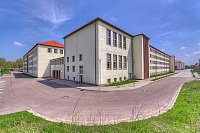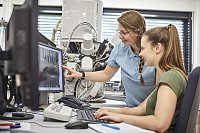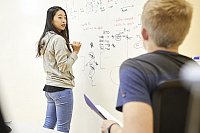
Contact
Geschäftsführender Direktor
Prof. Dr. Thomas Thurn-Albrecht
phone: +49 345 55 25 340
phone: +49 345 55 25 341
fax: +49 345 55 27 160
institutsdirektor@physik.un...
Von-Danckelmann-Platz 3
06120 Halle(Saale)
Institute of Physics
Excellence cluster "Center for Chiral Electronics" is coming
22.05.2025: MLU is one of the winners of the Excellence Strategy 2025 with the application submitted by the team led by Prof. Georg Woltersdorf from the Institute of Physics. The joint Cluster of Excellence “Center for Chiral Electronics” with the FU Berlin, the University of Regensburg and the Max Planck Institute of Microstructure Physics in Halle will receive up to 64.5 million euros in funding from 2026.
To the press release...
Alle Infos zum Physikstudium an der Uni Halle:
www.ich-will-wissen.de/studienangebote-der-uni-halle/physik-studieren

Main building of the institute at von-Danckelmann-Platz
The Institute of Physics is located on the Weinberg/Heide-Süd campus, in the immediate vicinity of Fraunhofer research facilities, the Technology and Start-up Centre (TGZ) and the Max Planck Institute for Microstructure Physics. The renovated physics buildings, which were occupied in 2009, offer state-of-the-art facilities for research and teaching.
Physics in Halle presents itself as an efficient centre for research and application of condensed matter, with internationally networked theoretical and experimental specialist groups. The main areas of research are:
- Synthetic and biological macromolecules,
- Solid interfaces and nanostructures,
- Energy conversion and storage materials,
- Medical physics (imaging).

NMR building of the Institute of Physics
Students are familiarised with the latest experimental and theoretical methods at an early stage and quickly come into contact with current research through individual support. Solid state physics with state-of-the-art scanning tunnelling microscopy or optical spectroscopy, polymer research based on a wide range of scattering methods and highly developed nuclear magnetic resonance (NMR) spectroscopy, each with attractive questions from basic and applied research, and many other activities of the experimental groups dominate the physics picture. Strong theoretical groups work with numerical and analytical methods in close interaction with the experiments.

The Institute of Physics as seen from the west
In addition to the standard Bachelor's and Master's degree programmes in physics and physics teaching, our special programmes in
- Medical Physics (in German language)
- Physics and Digital Technologies (in German language)
- Physik Plus 120 LP (in German language)
- Renewable Energies (in German language)
- Polymer Materials Science (in English language)
also offer a wide range of opportunities to get involved in research at the Institute and to be inspired.
search on physik.uni-halle.de:
| Managing director | Prof. Dr. Thomas Thurn-Albrecht |
| Deputy of the managing director | Prof. Dr. Jan Laufer |
Contact
Institut für Physik
Von-Danckelmann-Platz 3
06120 Halle
phone: +49 345 55 25 380
fax: +49 345 55 27 149
institutsdirektor@physik.uni-halle.de




